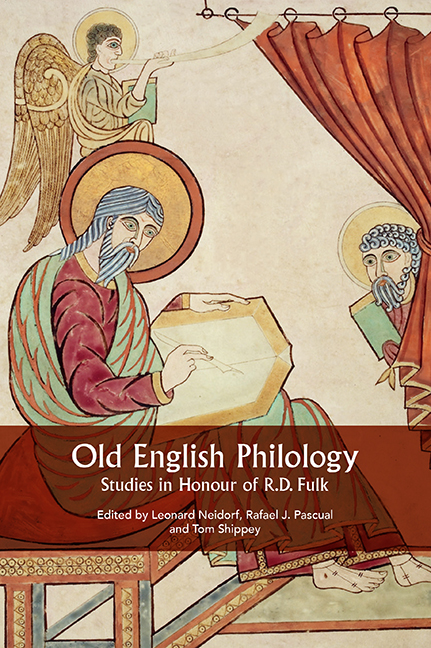Book contents
- Frontmatter
- Contents
- List of Illustrations
- Acknowledgements
- List of Contributors
- Introduction: R.D. Fulk and the Progress of Philology
- 1 Sievers, Bliss, Fulk, and Old English Metrical Theory
- 2 Ictus as Stress or Length: The Effect of Tempo
- 3 Metrical Criteria for the Emendation of Old English Poetic Texts
- 4 The Suppression of the Subjunctive in Beowulf: A Metrical Explanation
- 5 Metrical Complexity and Verse Placement in Beowulf
- 6 Alliterating Finite Verbs and the Origin of Rank in Old English Poetry
- 7 Prosody-Meter Correspondences in Late Old English and Poema Morale
- 8 The Syntax of Old English Poetry and the Dating of Beowulf
- 9 The Anglo-Saxons and Superbia: Finding a Word for it
- 10 Old English gelōme, gelōma, Modern English loom, lame, and Their Kin
- 11 Worm: A Lexical Approach to the Beowulf Manuscript
- 12 Wulfstan, Episcopal Authority, and the Handbook for the Use of a Confessor
- 13 Some Observations on e-caudata in Old English Texts
- 14 The Poetics of Poetic Words in Old English
- 15 Dream of the Rood 9b: A Cross as an Angel?
- 16 The Fate of Lot’s Wife: A ‘Canterbury School’ Gloss in Genesis A
- 17 Metrical Alternation in The Fortunes of Men
- 18 The Originality of Andreas
- 19 The Economy of Beowulf
- 20 Beowulf Studies from Tolkien to Fulk
- The Writings of R.D. Fulk
- Index
- Tabula Gratulatoria
- Anglo-Saxon Studies
8 - The Syntax of Old English Poetry and the Dating of Beowulf
Published online by Cambridge University Press: 29 May 2021
- Frontmatter
- Contents
- List of Illustrations
- Acknowledgements
- List of Contributors
- Introduction: R.D. Fulk and the Progress of Philology
- 1 Sievers, Bliss, Fulk, and Old English Metrical Theory
- 2 Ictus as Stress or Length: The Effect of Tempo
- 3 Metrical Criteria for the Emendation of Old English Poetic Texts
- 4 The Suppression of the Subjunctive in Beowulf: A Metrical Explanation
- 5 Metrical Complexity and Verse Placement in Beowulf
- 6 Alliterating Finite Verbs and the Origin of Rank in Old English Poetry
- 7 Prosody-Meter Correspondences in Late Old English and Poema Morale
- 8 The Syntax of Old English Poetry and the Dating of Beowulf
- 9 The Anglo-Saxons and Superbia: Finding a Word for it
- 10 Old English gelōme, gelōma, Modern English loom, lame, and Their Kin
- 11 Worm: A Lexical Approach to the Beowulf Manuscript
- 12 Wulfstan, Episcopal Authority, and the Handbook for the Use of a Confessor
- 13 Some Observations on e-caudata in Old English Texts
- 14 The Poetics of Poetic Words in Old English
- 15 Dream of the Rood 9b: A Cross as an Angel?
- 16 The Fate of Lot’s Wife: A ‘Canterbury School’ Gloss in Genesis A
- 17 Metrical Alternation in The Fortunes of Men
- 18 The Originality of Andreas
- 19 The Economy of Beowulf
- 20 Beowulf Studies from Tolkien to Fulk
- The Writings of R.D. Fulk
- Index
- Tabula Gratulatoria
- Anglo-Saxon Studies
Summary
The epic poem Beowulf is one of the best known and most widely translated of the extant Old English texts. Nevertheless, despite more than a century of scholarly debate, there is no absolute agreement on when the poem was written. Although a date of about 1000 is generally accepted for the one surviving manuscript, various types of evidence – archaeological, codicological, cultural, historical, linguistic, metrical, onomastic, paleographical, philological, political, semantic, sociological, theological – identify the poem's date of composition at various points between the seventh and the early eleventh centuries. Much of the linguistic evidence has been phonological (i.e., metrical) and morphological in nature rather than syntactic. Although some grammatical criteria have been developed for dating, they are not developed within current generative syntactic frameworks but rather based upon word order and the selection of lexical items that do not necessarily reflect syntactic distinctions. This is not surprising, for at least four reasons. First, much of the work on grammatical dating criteria was carried out before linguists started to investigate the formal syntax of Old English in generative frameworks. Second, most syntacticians do not attempt to analyze the language of poetry, since the syntax may be influenced by poetic constraints that do not affect prose texts and thus add an extra layer of difficulty to the investigation. Third, it is only within the last three decades that we have accumulated sufficient knowledge about the syntax of Old English prose and the quantitative patterns of syntactic variation and change during the Old English period to enable us to start to analyze the poetry. And finally, scholars writing before the release of two annotated corpora – the York-Helsinki Parsed Corpus of Old English Poetry (YCOEP) in 2002 and the York-Toronto-Helsinki Parsed Corpus of Old English Prose (YCOE) in 2003 – were handicapped by not having the benefit of being able to collect and quantitatively analyze Old English data quickly and easily.
Fulk has clearly expressed his views on the nature of evidence and argumentation in linguistics:
most science is built on hypothesis formation, and hypotheses can never be proved in the mathematical sense, but can only be rendered extremely probable. (Fulk 1992: 8)
- Type
- Chapter
- Information
- Old English PhilologyStudies in Honour of R.D. Fulk, pp. 144 - 171Publisher: Boydell & BrewerPrint publication year: 2016
- 4
- Cited by



